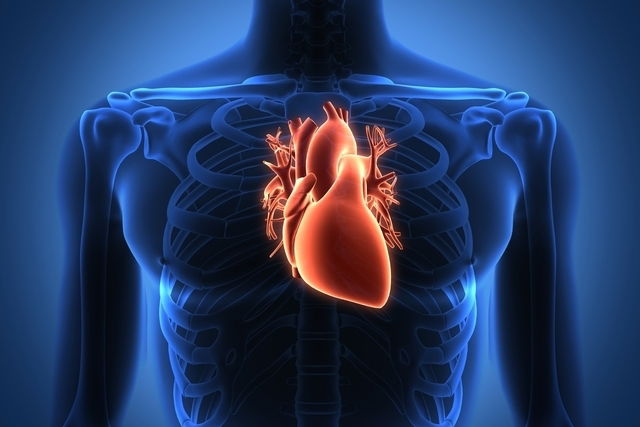Although heart pain is commonly associated with a heart attack, this type of pain is actually not often not caused by a heart attack. Common causes of heart pain include excess gas, anxiety and costochondritis.
Nonetheless, if you experience heart pain, you should seek assessment to rule out any serious conditions. A heart attack usually causes a tightening, pressure, or weight sensation on the chest, that lasts for more than 10 minutes. It can also radiate to other areas of the body, such as the back, arms or jaw.
When heart pain comes associated with other symptoms such as dizziness, cold sweats, difficulty breathing, intense headache, you should proceed to the emergency room immediately.

Why do I feel heart pain?
Some of the most common causes of heart pain:
1. Excess gas
This is the most common reason for chest pain, and it has no connection with a heart problem. Excess gas on the bowels is very common problem in people who have constipation. The accumulation of gas pushes the abdominal organs up and can cause a stabbing pain in the chest.
See what the most common causes of excessive gas are and they symptoms associated with them.
What to do: To eliminate excess gas, you can massage your belly with circular movements from top to bottom. You can also lie on the floor, bend your knees and press on your abdomen with your hands. There are some teas for bloating you can prepare to improve bowel function, and prevent gas accumulation.
Check-out other home remedies for gas that you can use.
2. Heart attack
Even though this is the first concern of those who have chest pain, it's a rare cause, and it's more common in people with uncontrolled high blood pressure, very high cholesterol, diabetes and smokers.
The most common heart attack symptom is a tightening feeling, but it can also feel like a piercing, stabbing, or burning sensation that may radiate to the back, jaw, and arms, causing a tingling sensation. Learn more about the symptoms of a heart attack and how they can present.
What to do: If you suspect you may be having a heart attack, it is essential to call an ambulance or proceed to the the nearest hospital or emergency room. If the victim loses consciousness, call 911 and start CPR. In case of loss of consciousness, in addition to calling the ambulance, it is recommended to start cardiac massage.
3. Costochondritis
Costochondritis is characterized by an inflammation of the cartilage that connects the ribs to the sternum (a bone that is located in the middle of the chest). This can happen due to bad posture, arthritis, excessive physical exercise, or deep breathing.
Depending on the intensity of the symptoms, the pain that occurs due to costochondritis may be confused with a heart pain.
Also recommended: Pain in Middle of Chest: Top Causes & Symptoms tuasaude.com/en/pain-in-the-middle-of-the-chestWhat to do: In this case, it is recommended to rest and apply a warm compress to the area, as this will help reduce inflammation and other symptoms of discomfort. However, in some cases, especially when the pain is very strong and constant, the doctor may prescribe anti-inflammatories.
4. Pericarditis
Pericarditis is an inflammation of the pericardium, which is a membrane that lines the heart. This inflammation causes a very intense pain which can be easily confused with heart attack pain. Pericarditis usually appears after an infection or due to rheumatic diseases, such as lupus.
What to do: The treatment for pericarditis is guided by the cardiologist and may vary according to the severity and cause of the it. Treatment may vary according to the cause, and the doctor may prescribe antibiotics, analgesics and/or non-steroidal anti-inflammatory drugs.
Also recommended: Sternum Pain: Symptoms, What Causes It, Diagnosis & Treatment tuasaude.com/en/sternum-pain5. Myocardial ischemia
Myocardial ischemia is a decrease in the amount of blood that passes to the cardiac muscle. This condition can cause a strong pain or burning sensation in the chest, which can radiate to the nape, chin, shoulders, or arms It can also cause palpitation to appear. Learn more about what can cause chest pain and what to do.
The main cause of myocardial ischemia is atherosclerosis, so the best way to avoid it is having an active lifestyle, maintaining healthy habits and controlling your diet by not eating fatty or sugary foods. In addition, the doctor may prescribe medication that eases the passage of blood as it acts on the plaque that obstructs the artery.
What to do: It is important to consult a cardiologist so that the cause of cardiac ischemia can be identified and treated. In general, the doctor may prescribe medications that reduce heart rate, dilate blood vessels and/or control blood pressure, as well as an exercise plan and a low-fat diet.
6. Heart arrhythmia
Heart arrhythmia is when the heartbeat is irregular, i.e., the heartbeat is too fast, or too slow. In addition to heart pain there can be other symptoms such as weakness, dizziness, malaise, paleness and cold sweats. Learn more about symptoms of arrhythmia and how they can present.
Arrhythmia can happen in healthy people as well as those who have an already established heart condition, and the main causes are high blood pressure, coronary disease, thyroid problems, intense physical activity, heart failure, anemia, and aging.
What to do: Treatment for a heart arrhythmia is guided by a cardiologist and can vary according to the severity and the underlying cause. The doctor may prescribe medications to help manage abnormal rhythms. Bradycardia may be treated with a pacemaker, while tachycardia may require an ablation.
7. Panic attack
Panic attack is a psychological disease in which there are sudden outbreaks of fear which cause symptoms such as breathlessness, cold sweats, tingling, loss of control, ringing in the ear, palpitations, and chest pain.
The pain felt during a panic attack is sometimes confused with a heart attack, however, there are some features that set them apart. The pain caused by a panic attack is usually acute and concentrated in the chest, while the pain caused by a heart attack is stronger, gets worse over time, can radiate to other areas of the body and it lasts more than 10 minutes.
What to do: it is important to follow your psychiatrist's treatment plan. Treatment usually involves the use of antidepressant and anxiolytic medications to manage symptoms, and ongoing psychotherapy should be ongoing.
8. Anxiety
When you experience an anxiety attack, muscle tension in the ribs increases, and the heart rate accelerates. This can contribute to a tightening sensation or pain in the heart.
In addition to chest pain, other symptoms of anxiety include rapid breathing, nausea, changes to bowel functioning and excess sweating.
What to do: depending on the intensity, it is possible to alleviate anxiety symptoms through calming teas, such as chamomile or linden tea, for example. However, when anxiety attacks are frequent, the doctor may recommend the use of anxiolytics or antidepressants, consultation with psychologists and physical activity. for the cardiac symptoms. Learn about the anxiety medication your doctor may consider to manage this condition.
Also recommended: 10 Natural Remedies for Anxiety (& How to Prepare) tuasaude.com/en/natural-remedies-for-anxietyWhat to do when you feel heart pain
If heart pain lasts more than ten minutes or comes with other symptoms, it's important to go to the hospital.
Other symptoms that can alert to a serious condition include:
- Tingling;
- Dizziness;
- Cold sweats;
- Difficulty breathing;
- Intense headache;
- Nausea;
- Feeling of tightening or burning;
- Tachycardia;
- Difficulty swallowing.
If there is any pre-existing cardiovascular disease, such as high blood pressure, it is very important to seek imediate medical assistance.
